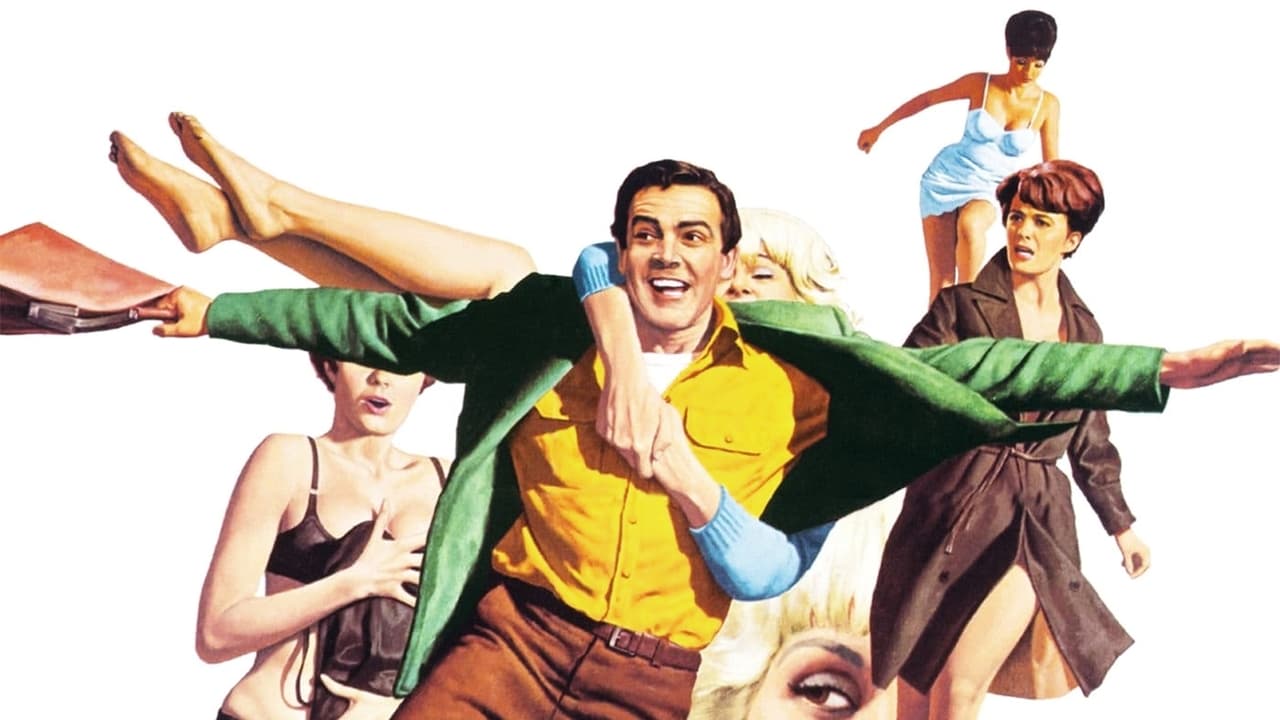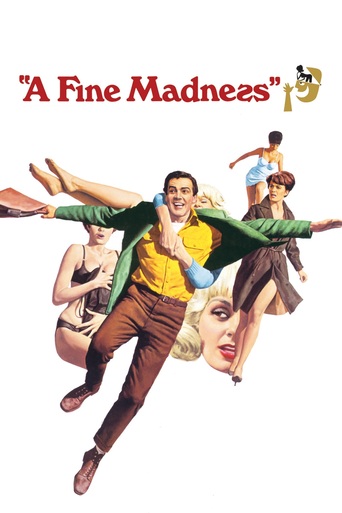

A Fine Madness (1966)Plot In A Paragraph: Samson Shillitoe (Connery) a genius poet, who is irresistible to women but is plagued by writer's block. I hate this movie. I bought a copy from France when I hadn't seen it, but wanted to complete my Connery collection. The collector in me is glad I did, but personally I wish I hadn't wasted my money. If you find Connery using his wife (Joanne Woodward) as a punching bag funny, you may enjoy it, but I don't find anything to laugh about here!! I will applaud Connery for trying something totally different in an attempt to move away from Bond, but I wish this wasn't the movie he chose to do so!! This is only the second time I watched it, and I have turned it off. A Fine Madness tanked at the box office.
... View MoreThis 1966 comedy by Warner Brothers pretty much nailed the fad of "free love" from the sexual revolution. Sean Connery plays Samson Shillitoe, a divorcée who's remarried. But he accommodates other women as well – any and all, who come on to him. It's definitely not a family film, and not much of a comedy either. The only reason I could see Connery and Joanne Woodward (who plays Rhoda Shillitoe) doing this film is for their roles. They are very good at these diverse, different characters, and show their acting talent. But for their excellent acting, "A Fine Madness" wouldn't rate more than one star. The screenplay is downright terrible, and the story has more holes than a slice of Swiss cheese. Comedies are supposed to make one laugh, but this one fails on that score as well.
... View MoreAlright, this film is generally awful, admitedly...However, I always try to look at any motion picture in the context of it's day and in it's retrospective historical perspective.I like to look at movies as sociological studies, and the best ones transcend their time, becoming truly timeless."A Fine Madness" fairly stinks of clueless farce. The filmmakers completely lacked any shred of inspiration; a must for ALL art, IMHO.Just looked at it; it's big,loud and randy without any awareness of the cultural changes about to happen in the late 1960s. These artifacts are unintentionally funny, as with any generation gap showing the older generation trying to be hip, but just embarrassing themselves, as when the Rat Pack tried fruitlessly to stay cool in the late 60s. Hollywood was out of touch with the youth of the counter culture, and with some exceptions, like "Hard Days Night", "Alfie", "Medium Cool" and "Easy Rider", most 1960s movies that tried to look authentic and relevant to the times, failed.So, despite its badly written characters, it's hopelessly dated Psychiatric themes, its corrosively dated sexism and the apaulingly visionless, artless presentation, there ARE a few interesting elements.Clearly a big budget film, I was impressed by the progressive bravado that the director showed in manhandling New York City. These bold tracking shots and cunningly calculated hand held camera work was quite new for 1966. These classy looking outdoor location scenes merging actors staying in character with the hubbub of the steaming cauldren of street life in Manhattan could not have been pulled off with a small budget. Look at that amazing tracking shot of Connery running on the Brooklyn Bridge. Many neighborhoods were captured in a stunning naturalism that was unprecidented. So if nothing else, it is as amazing a record of the city as when Harold Lloyd caught it back in the 1920s.It's too bad the story couldn't have been embued with a great script. Perhaps something about the Village, with all it's alternative zeal, and incorporating the changing times which the city was such a part of.The Music score tried to be wacky and inventive too...One could even see elements of Danny Elfman 30 years earlier, with all the big, burlesque horns and drums. Evidently the score was trying to compensate for the dull script and shrill, yet pedestrian performances by spicing up the soundtrack. But after a while the relentless music became as grating as Joanne Woodward's shrill hollering voice.We have to wonder what Billy Wilder or Elia Kazan would have done for this material? Sigh...But Hollywood has always been bottom line, and wants to make its profit fast. Art? Who cares. Vision? Timelessness? Feh, sez the Movie Machine that has forever pandered to the lowest common denominator.One leaves this dreadful film with the notion that it was teetering right on the precepis of the Martini vs. Mariquana epochs and fell back into its pre-sexual revolution, postwar establishment ethos with the thud of someone who just missed his train.Interestingly and awkwardly, one is easily reminded of one of Connery's famous statements in a latter interview where he cavalierly remarked that 'Women should be hit now and then to keep them in line', or something to that effect. One can imagine his brutish Samson saying the same thing in this antique archive of a darker time in American HIStory.
... View MoreOkay, to borrow a few things from the previous commenter's observations, sure, this is an adaptation from a novel, and apparently the main character is an obnoxious lout who happens to be a genius.Here's where this film fails in just about every department.Not for a second do we buy that Sean Connery's Samson is a "genius" in any sense of the word. He's a thick-headed brute who hollers anti-establishment rants that really aren't enlightened nor are they particularly radical. The fact is, though, that he hollers a lot. There is no modulation to Connery's performance. No sense of a human being in there. His character is drawn to just be the hunky societal interloper whose mere physicality and scowls suggest a counterpoint to everyday norm. Genius, he is not.Topping poor Connery in the shouting department is the screeching yowl of Joanne Woodward, whose hapless wife character of Samson, Rhoda, is given all the depth of a punching bag (literally). Connery takes swipes at her head, connecting with her skull in the end, along with throwing every dish in the apartment in her direction. He even shoves her down the staircase resulting in a broken leg, and perhaps, 1960's sentiments saw this as an uproarious moment of hilarity. You know, madcap abuse of the wife is always so mercilessly humorous. Anyway, you get the picture (reference the above reference to "thick-headed brute").Jean Seberg is absolutely wasted in this performance. She plays the stifled wife of a renowned psychiatrist, Patrick O'Neal, who for some reason, and quite illogically I can only add, winds up having sex with Connery in a whirlpool bath and then dumping him the next time she sees him. There is no logic in having her character even in this film other than to flesh out the above-the-line star wattage on the marquee.Only Clive Revill, playing a hare-brained psycho-therapist in every sense of the word, cuts loose with the material and lends a Peter-Sellers-like diversion for a total of 3 minutes screen time.I cannot conceive of any audience, whether in the '60s or today, eliciting anything more than ho-hum chuckle and a wan smile over this pale comedy with absolutely no focus and one of cinema's most ill-conceived one-note main characters.My rating: 1 out of 5 stars.
... View More